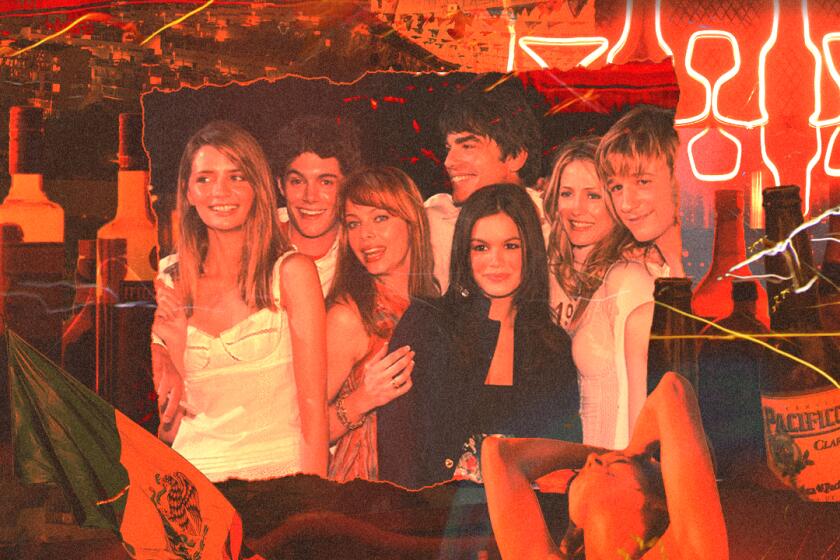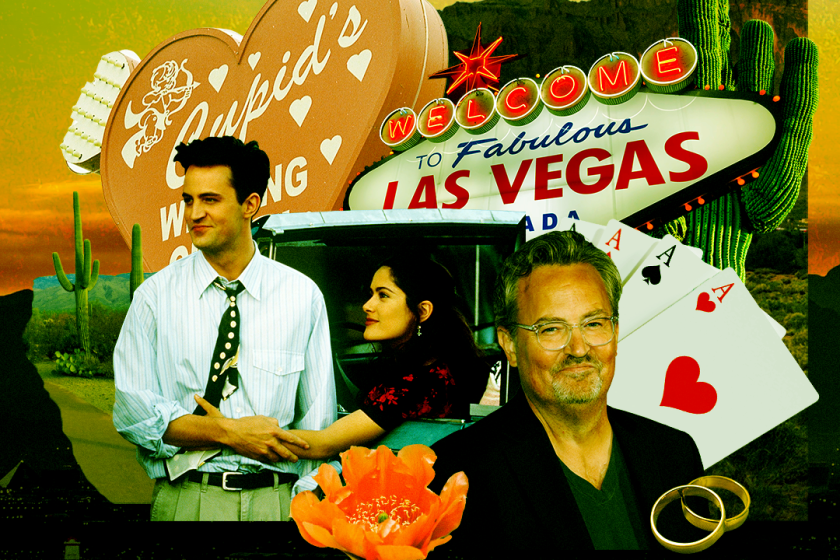
- Share via
In September, I was invited to KCRW’s “Press Play With Madeleine Brand” to talk about the 20th anniversary of the teen drama “The OC.” I had written about the infamous episode in which the gang of trust-fund Hollister models, and one displaced Chico bad boy, head to Tijuana for a weekend of partying.
Among the many offenses to my hometown seen in the episode are constant references to “donkey shows,” Marissa Cooper grumbling that it’s “gross there,” and the only two Mexicans shown are depicted salaciously staring at a wasted Marissa.
The general sense of the episode is that Tijuana is where bad things happen to innocent white kids who wear puka shell necklaces.
Twenty years ago the hit television show ‘The O.C.’ traveled to Tijuana and perpetuated every negative stereotype of the city.
In my interview with Madeleine Brand, she remarked that this probably wouldn’t happen now.
“I’d like to think we progressed a little bit in our attitudes, and that [this] episode would not fly today, written like that and shot like that and acted like that,” she told me. “First of all, it wouldn’t be an all-white cast. And second of all, I would hope that there would be more sensitivity to how the Tijuana scenes were portrayed.”
I wasn’t so sure. I do think there’s a higher likelihood that there would be at least one character, most likely non-white, who would chime in with a “that’s pretty offensive, dawg. Also, did you know they invented the Caesar salad in this bustling cultural destination?”
But as it stood, Tijuana being “gross,” dangerous and a den of perversions was taken at face value. No one challenged it, and so the understanding is that Tijuana is, indeed, all those things even though the same terms could be used to describe a Buffalo Wild Wings under certain conditions.
However, the even bigger truth to me was that this is exactly how people like this talk. I’ve heard it enough, 20 years ago and today, to know this to be true.
I also remembered this while watching “Fools Rush In” for another piece I wrote. In televised versions of the 1997 film (which are edited for a variety of reasons, as opposed to versions one can watch by renting or buying it on Apple TV or Amazon Prime), Alex Whitman’s parents surprise him with a visit to his Las Vegas rental. Upon meeting Isabel (played by Salma Hayek), who unbeknownst to them is Alex’s wife, they assume she’s the housekeeper and make various comments about how Alex must find great “help” being so close to Mexico.
Column: ‘Fools Rush In’ has its issues, but Perry and Hayek’s chemistry gave us a charming tale of intercultural dating
The Matthew Perry-Salma Hayek rom-com withstood the test of time and is still a great lesson in intercultural relationships.
These lines are cut from the television version, even though they illustrate Alex’s parents’ racist assumptions. Ostensibly, they were cut to show greater sensitivity to Mexican viewers, but on the other hand: Nah, I don’t think so.
Because who are we protecting when we pretend white people don’t sometimes say wildly offensive things about us? It’s certainly not us, who still experience racism and offensive remarks, only more often now with heart at the end of it.
Our comfort and safety remain secondary to the feelings of others.
“These moments being edited out is to make those who might suffer from some kind of white guilt feel better,“ said Frederick Luis Aldama, a professor of Latino Media Arts & Studies at the University of Texas at Austin and the author of “Reel Latinxs: Representation in U.S. Film and TV.”
“We want to hold people accountable to better storytelling for sure,” he added. “We have been and we will continue to do so. But on the other hand, you’re obliterating instead of educating.”
Aldama argued that erasing instances of racism from the past does more harm than good when it comes to creating change in Hollywood.
Column: The lack of Latino representation in film is deeper than negligence. It’s intentional exclusion
According to the recent report from the Annenberg Inclusion Initiative at USC, Latino representation in Hollywood has not shown any meaningful growth in the last 16 years.
“How are we gonna learn from these examples, even though they are terrible if they aren’t there?” he asked. “How will they learn the nuances that ask audiences to laugh at and not laugh with? If we go and indiscriminately obliterate, past and present, these egregious and even racist things that exist, how are we going to be able to critically educate our students to be able to deal with this stuff? Because it will continue,” said Aldama.
It most certainly will.
This was a topic of conversation in 2020 when Tina Fey and Robert Carlock, executive producers of the Emmy-winning NBC comedy “30 Rock,” asked that episodes where white characters were in blackface be removed from streaming platforms. Anyone who’s done a rewatch of “30 Rock” can tell you the use of blackface is far from the only instances of overt racism on the show.
This all came about during the Black Lives Matter protests following the murder of George Floyd, which prompted several networks and platforms to add warnings and introductions before any series or film that features racist and offensive content.
It also gave us several Democratic leaders wearing Kente-cloth stoles in an embarrassing, obtuse and ultimately shallow performance of solidarity considering where we are now with regard to justice and safety for Black and brown people. Very little has changed.
More recently, there’s a growing trend of online criticism demanding film and TV characters be moral or that films and series be diverse for diversity’s sake. But this ends with non-white people being treated as an accessory to bolster the goodness of a white character and to teach them to be more thoughtful toward other people’s races and cultures.
Despite a marketing hurdle, the Mexican film ‘Radical’ reached No. 5 at the U.S. box office, grossing $2.7 million in its first week.
When we know, really, choices are often made just to quiet any criticisms (Look, we gave Carrie a Black friend! Stop yelling at us!).
As if we can’t see the superficiality of it all — the pretense of representation and the paternalistic nature of doing something for our benefit when we can see how hollow it is.
Especially as, once again, Latinx representation in Hollywood remains in the gutter, with the number of Latino screenwriters and directors falling below 3% in 2022, and showrunners sitting at 1.4%.
Removing lines and dropping in a non-white character continues to be used as a Band-Aid for a much larger systemic issue.
I want the world we see on screen to reflect the world truthfully and as it should be. But shielding the culpable and accepting the bare minimum is not the way to go. As I tell every friend dating someone who isn’t pulling their weight, don’t let them convince you that you’ve been given a full meal when all they’ve fed you are crumbs.
Alex Zaragoza is a television writer and journalist covering culture and identity. Her work has appeared in Vice, NPR, O Magazine and Rolling Stone. She’s written on the series “Primo” and “Lopez v. Lopez.” She writes weekly for De Los.
More to Read
The Latinx experience chronicled
Get the Latinx Files newsletter for stories that capture the multitudes within our communities.
You may occasionally receive promotional content from the Los Angeles Times.










